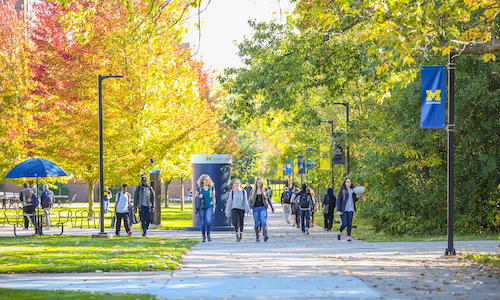
When you think of the kinds of campus programs that impact student success or boost graduation rates, you probably think of things like supplemental tutoring or more flexible class schedules. But colleges across the country are now taking a hard look at how transforming mental health services could impact students’ academic lives.
“College is this really unique place where students come across almost every experience in life mashed into four to six years,” said Associate Director of Counseling and Disability Services Vivian Stovall. “They’re shifting and growing in their personal identity, they’re navigating relationships, they’re figuring out how to fit in and compete with peers — and all that can be incredibly stressful. So I think it only makes sense that we’re focused on their mental health and wellness from the moment they step on to campus.”
Indeed, as part of a new partnership with the JED Foundation, a national mental health and suicide prevention nonprofit, campus leaders have fresh insight into the kinds of challenges UM-Dearborn students commonly face. Among the headline findings of the JED Campus initiative’s survey of more than 600 participants: UM-Dearborn students actually had higher rates of depression and anxiety compared with students at peer institutions.
“I think it’s easy to rest on the idea that we’re a commuter campus, and so our students don’t face the same issues — or experience them as frequently — because many of them might still be living at home,” said Dean of Students Amy Finley, who sits on UM-Dearborn’s JED committee. “But now we’ve learned loud and clear that isn’t the case. So this is an opportunity to be really transformational and reshape how we serve students based on exactly what they need.”
To that end, the collaboration with JED Campus not only comes with a deep well of current data on students’ mental health needs. It also includes program and policy recommendations — a guiding theme of which is the importance of integrating mental health into multiple aspects of campus life, including the classroom and academic policies. That could involve small tweaks, like having faculty include mindfulness and meditation exercises at the end of classes or training more faculty and staff to be tuned into the warning signs of mental illness; or bigger reforms, like policies that make it easier for students to integrate back into academic life following a mental health-based medical leave.
It’s still early days for UM-Dearborn’s new JED committee, which hopes to implement ideas like these over the next four years of its collaboration with the JED Foundation. But the concept of building a more holistic mental health culture on campus is already gaining momentum: Two kickoff workshops — one for students, another for faculty and staff — drew more than 100 participants. And Director of Counseling and Disability Services Sara Byczek said UM-Dearborn already has a running start on some of the bigger JED recommendations. Adding a student-led peer support group program, for instance, is something Byczek already had in the works and officially launched this fall.
“This is a great example where students are taking responsibility for each other’s health and wellness,” Byczek said. “And that’s the heart of this approach: It’s the idea that mental health is everybody’s concern — not just a counseling center therapist or the psychology department. It’s about how we can look at everything we do on campus through a mental health lens, and make sure we’re doing everything we can to help our students be successful.”




